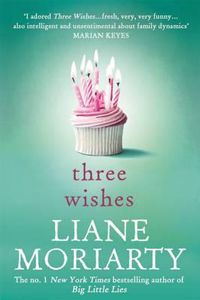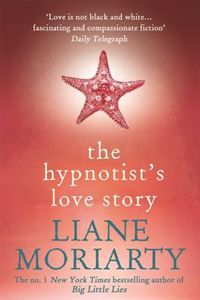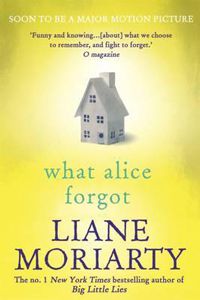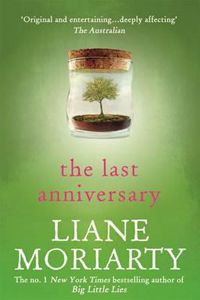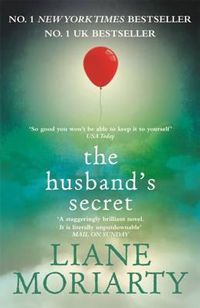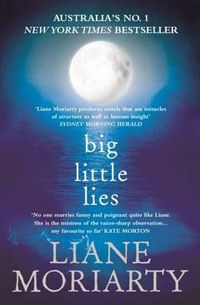When it comes to Liane Moriarty, I’ve been the ultimate fanwoman since 2009, the year that What Alice Forgot was published. That’s just my overblown way of saying that I’ve read all of her novels and drop everything when a new one comes out, suddenly finding time to sit for hours straight while the children starve, work piles up and my home turns to rubble.
For the duration of each book, Liane Moriarty feels like my incredibly funny, sharply observant and quietly clever friend. She’s no show-off. She can be warm and perceptive, artful and surprising. What you’ll see on her book covers are pretty cupcakes, balloons and sweetly miniature objects, which is the secret code for: spousal abuse, murder, infidelity, sibling rivalry, stalking, amnesia, divorce, post-natal depression and rape, when you’re a female author. While Moriarty’s female characters are conformist, they frequently poke fun at themselves for this.
When a Liane Moriarty book is over, like all good fanwomen I remember that Liane is not actually (alas) my friend and that I should call my real-life ones and go out for a drink with them. And as they’d testify, I might use that as an opportunity to suggest the perfect Liane Moriarty book for them…
For a friend who gets caught up in sibling dramas:
Three Wishes
The book opens with someone throwing a fork at their sibling’s pregnant belly – but who threw the fork and whose belly was it? There are three sisters to chose from – triplets, in fact – and the narrative retraces their steps over the year leading up to this fracas.
For me this book was a taste of things to come in Moriarty’s most recent – and globally successful – novel, Big Little Lies, in revealing her skill at the multiple narrative, which is put to good use in showing us the mechanics of sibling rivalry and the private versus public face of long-term relationships. The part of the story that had the most impact on me also crops up in Big Little Lies but it’s too much of a spoiler to mention – suffice to say that while it could be argued that some of Moriarty’s characters get away with vile behaviour, others most certainly don’t.
For a friend who wonders what her therapist’s life is like:
The Hypnotist’s Love Story
I know that when I’ve had therapy, or even just gone to see a naturopath or my GP, I’ve often wondered if behind that calm, soothing exterior was a person who didn’t always take their own good advice/drink only herbal teas and meditate twice a day. Ellen is a hypnotist whose clients come from all walks of life. To them she presents a stoic exterior but behind the scenes her love life is a catalogue of disasters. She falls in love, and tentatively hopes this might be it – which it probably would be were it not for the fact that Patrick has a stalker. Being above all a compassionate writer, with a wicked sense of humour, Moriarty allows us to see the stalker’s side of things. There are probably many of us who get drawn into some pretty stalker-esque activities once in front of a computer, so it’s not that difficult to empathise with someone who has forgotten where the line is. I found this story to be on the lighter side, compared to Big Little Lies or The Husband’s Secret, and I loved the balance of Ellen being in a sympathetic position but with some frustrating personality traits versus her stalker being entertaining but, clearly, deranged.
The ‘Where Did My Life Go?’ Book:
What Alice Forgot
You may have read about a new memoir called I Woke Up In The Future by Naomi Jacobs, who went to sleep one night in 2008 as a 32-year-old mother and woke up the next morning believing she was still a 15-year-old school girl. As traumatic and unusual as that story is, it taps into something universal about the passing of time. How many of us wake up on our fortieth birthday and think, ‘But I still feel [insert appropriate age] inside’?
What Alice Forgot is a very approachable and amusing version of this. Moriarty’s characters don’t do it anywhere near as tough as Jacob’s memoir. Alice has a knock on the head at thirty-nine, and wakes up believing she’s a childless, carefree twenty-nine year old. But like the memoir, the story is about coming to terms with who you’ve become, and making peace with that.
For a friend who is drawn to eccentric people:
The Last Anniversary
In this story, Moriarty really lets her imagination go. For me, this is the one that connects her most with her equally brilliant writer sister, Jaclyn Moriarty, who has a fondness for the eccentric and the whimsical, overlying her sharp observations about friendships and family. Their sister Nicola Moriarty also writes novels and is, naturally, on my TBR pile – what a family! Jaclyn confided on a recent panel that their father used to give the girls pocket money in exchange for stories, which is the most successful example of parental bribery I’ve ever heard of.
This story takes place on Scribbly Gum Island (I was quite heartbroken to discover that it isn’t a real place – you too will want to go there). The main character, Sophie, is a really likeable woman who is worried that she’s left it too late to have marriage and kids. She couldn’t be more surprised to inherit a house on an island from her ex-boyfriend’s aunt, and once she gets there, she gets drawn into family secrets that go back generations. I thought this was really quirky and original, and years later if I close my eyes I can still see Scribbly Gum Island.
For a friend who is guilty of snooping:
The Husband’s Secret
Although I have great affection for all of Liane Moriarty’s books, the most recent two are my personal favourites. It’s as if everything she is good at in the other four stories is dialled up a notch. Like What Alice Forgot, The Husband’s Secret and Big Little Lies are quietly damning portraits of middle-class suburban life.
The Husband’s Secret opens with a juicy moral dilemma: If you found a letter addressed to you, but which quite clearly stated that it was only to be opened upon the death of its author (in this case, your husband), what would you do? Open it, obviously. Which is what Cecilia does. The underlying storyline is incredibly affecting, and I felt a lingering sense of sadness and injustice afterwards, even though the journey had all of Moriarty’s trademark humour. If full retribution is high on your agenda, you need Big Little Lies.
The ‘School-Run Scandals’ Book:
Big Little Lies
My copy of Big Little Lies very quickly did the rounds of my school-community friends (in several cases, wife passed it on to husband before it went on to the next household), after I implied that we might recognise the playground politics in the storyline (okay, I didn’t imply it, but rather just said: “This is us!”). As Moriarty is so good at making you empathise with her main characters (even while you judge them), finding out very early on that one of them has died is a brilliant hook. This is teased out expertly, as the ‘little lies’ behind each closed door is revealed. There can be such bitchiness, insecurity and self-regard in the playground (I mean among the parents, obviously), and this is captured perfectly.
As I come to the end of this guide, I can’t help envying those of you who are about to spend some very entertaining hours immersed in one of these stories.


